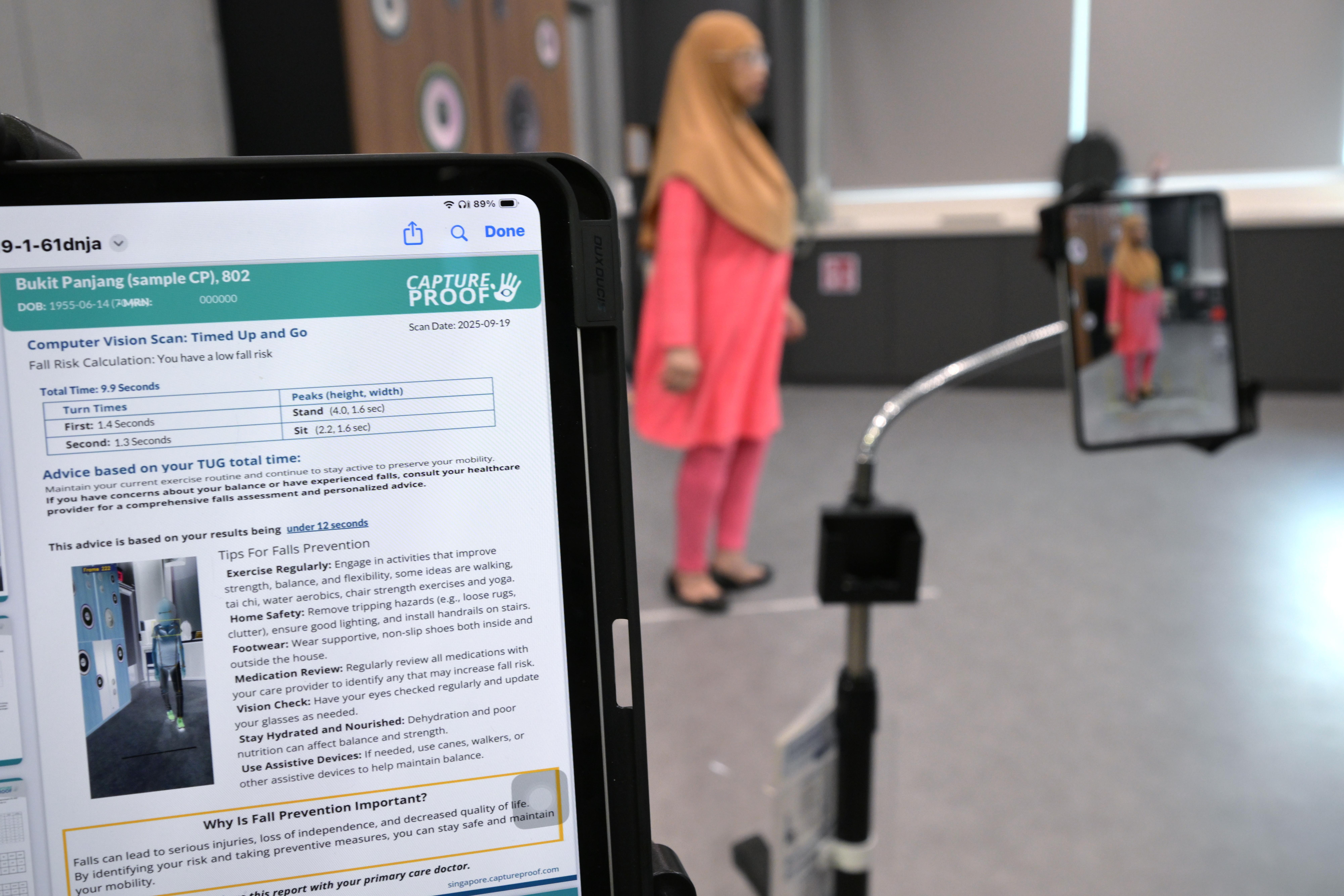By Yap Wei Qiang for The Straits Times
Copyright tnp

A new artificial intelligence (AI) software deployed by NTUC Health aims to predict the fall risk of seniors, allowing early intervention and prevention of actual falls.
Under CaptureProof Fall Screening, seniors have to do two tasks – stand up from a seated position, and walk in a straight line.
Video recordings of their movements, posture, gait and balance, as well as the time they take to complete the tasks, will be analysed with AI software to predict if they have a high, moderate or low risk of falls. The software was developed by digital health firm CaptureProof.
For instance, if a senior takes more than 12 seconds to complete five rounds of standing up from a seated position, this person faces a higher risk of falling.
The appropriate interventions, developed in partnership with clinicians from the National University Health System, can then be introduced. These include strengthening the senior’s core muscles and addressing issues of malnourishment or muscle loss.
This screening was first piloted at NTUC Health’s Boon Lay Active Ageing Centre (AAC) in July 2025, with a focus on frail seniors. Sixty-three seniors have been screened to date, and there is a target of screening 200 seniors by end-2025.
There are plans to deploy this AI screening to all of NTUC Health’s AACs, with the possibility of having trained staff take it to seniors’ homes for ease of assessment.
This was one of two new partnerships announced by the eldercare provider at the official opening of its latest AAC in Bukit Panjang on Sept 19.
The second partnership is a research project with the national Geriatric Education and Research Institute that aims to examine if community-based programmes can help socially isolated seniors to eat better and stay healthy.
The research team is currently in the midst of interviewing 30 seniors aged 60 and above who are living alone, as identified by NTUC Health and its community partners. Preliminary findings showed that seniors who live alone face difficulties in cooking proper meals for themselves, and may choose canned food over fresh ingredients.
The new AAC, located on the second floor of Bukit Panjang Hawker Centre and Market, was officially opened by Health Minister Ong Ye Kung on Sept 19.
This is NTUC Health’s 25th AAC, and the first to share a building with a hawker centre.
The AAC started its operations in April 2025, and has since seen about 900 seniors participating in its activities, with close to half, or 44 per cent, living outside of Bukit Panjang.
Describing the co-location as a “perfect fit”, Mr Liang Eng Hwa, the MP for Bukit Panjang SMC, said at the opening ceremony that there is naturally great human traffic flow at the hawker centre and market, and seniors can easily join AAC activities after they are done with their meals at the hawker centre.
Mr Ong echoed the benefits of the shared location and urged various AAC operators to work closely with grassroots organisations and nearby hospitals, tapping residents’ networks and community health posts to engage more seniors.
Ms Chan Su Yee, chief executive of NTUC Health, said the eldercare provider has been scaling up its services to engage more seniors, in line with the recently announced Age Well Neighbourhoods initiative.
It earlier announced it will expand its network of AACs to 27 by end-2025, but this has since been revised to the first quarter of 2026. The two new AACs will be in Bishan and Gek Poh.
Ms Chan said there are still difficulties in engaging five groups of seniors: men, those from minority communities, frail seniors, socially isolated individuals and seniors who are caregivers for their elderly parents, grandchildren or other relatives.
NTUC Health has tailored programmes to reach out to these different groups, such as curating male-only activities, sending befrienders to the seniors’ homes and working with partners at places of worship.
“Supporting them is just as much a part of our AACs’ mission, which is to ensure every senior can access resources that enable them to live well at every stage of their life,” said Ms Chan.



